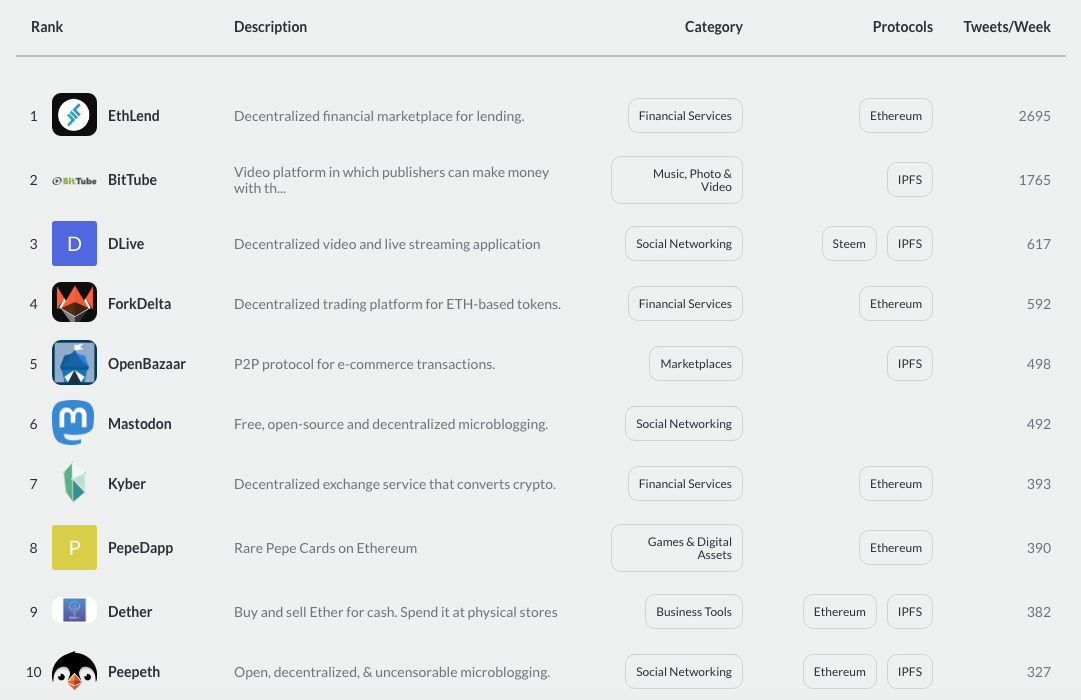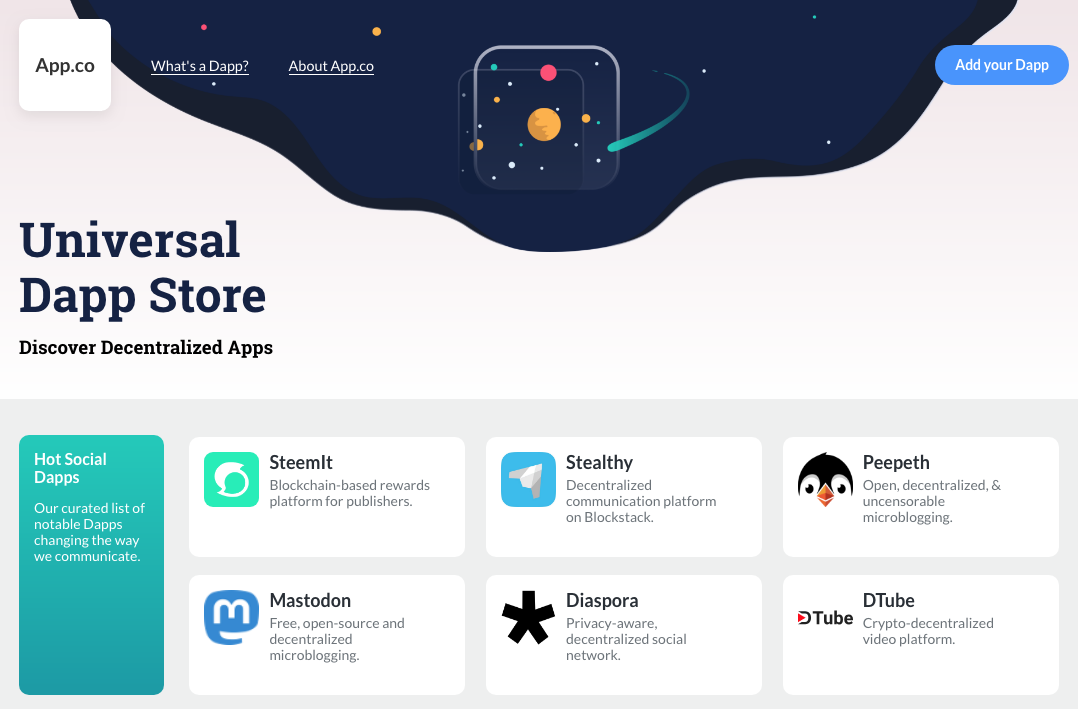Dapps, a.k.a. decentralized apps, have up till now been hard to find on the Web. But the blockchain browser company Blockstack aims to change that with its new directory, Universal Dapp Store. This could be a turning point for dapps, because Blockstack has the heavyweight backing to popularise the use of distributed apps. The company counts Fred Wilson’s Union Square Ventures and self-styled crypto guru Naval Ravikant as investors.
One thing the Universal Dapp Store doesn’t have at the present time is breadth. At time of writing, it lists just 205 dapps. That pales into comparison to Ethereum’s own unofficial directory, State of the Dapps, which bills itself as “The curated list of 1,577 decentralized apps.”
However, there are a couple of key differences between Blockstack’s directory and Ethereum’s. Firstly, Blockstack includes dapps that don’t use Ethereum’s platform (indeed, as I’ll note below, some of the listed dapps don’t even use blockchain). The other key difference is user friendliness. Ethereum’s list is useful if you want to try out the latest developer experiments, but it’s not designed for the casual user. The 205 dapps listed by Blockstack appear to be relatively mature, or at least able to be trialled without a visit to GitHub.
It must also be noted that Etheruem’s directory is not entirely serious. The about page for State of the Dapps states, “There are many projects covering different fields such as health, Ponzi schemes, games, virtual reality, artificial intelligence, education, registries, job markets, tinder for horses and many more.” It seems a developer with a sense of humour has edited that recently. Although I don’t doubt there are a number of ponzi schemes in there!
Blockstack’s directory is modelled after Apple’s App Store. So it is clearly aimed at end-users and not developers. It even attempts to rank the dapps, using a rather opaque “Tweets/Week” ranking mechanism (which seems ripe for gaming).
Curiously, the categories and tags you see in the screenshot below are not clickable. Presumably this will change once more dapps get listed. Indeed, in an obvious effort to fill out the Universal Dapp Store, Blockstack also recently announced a $1 million fund for ten decentralized social networks.

The Universal Dapp Store wants to be seen as akin to Apple’s App Store, but currently it’s more reminiscent of the old 1990s Yahoo! directory. That’s partly because it has relatively few dapps at this stage (205), so it feels more 1990s than 2010s. But also the one-line descriptions beside each dapp remind me of the descriptions that Yahoo! wrote for its directories. If you look at this January 1997 snapshot of Yahoo’s directory, you’ll see what I mean.

When you have to describe what a dapp or site does, clearly it’s early days in the ecosystem. In other words, educating users is just as important as listing out the products. That was true of Yahoo! in the 1990s, and it’s true for Blockstack in 2018.
One final thing of note: not every dapp listed is a blockchain app. In the above list, Mastodon (#6) is a decentralized version of Twitter – but unlike its competitor Peepeth, it doesn’t use blockchain at all. Also the long-running would-be Facebook usurper, Diaspora, is a featured dapp in the store. But it too does not use blockchain. I don’t see anything wrong with this, by the way. As I noted in my Defining Web 3.0 post, not all decentralized apps need to utilise blockchain. In fact, many should steer well clear. Peepeth’s current UI issues and risks arguably make it less compelling as a Twitter alternative than Mastodon.
Overall, Blockstack has made a good start with its dapp directory. Although it looks like they may have competition soon. A couple of weeks before Blockstack’s dapp store launched, two former JPMorgan employees announced Clovyr at Consensus 2018.
Clovyr is different from Blockstack’s dapp store, firstly because it is targeted at developers and enterprises. It’s also not just an app portal, it’s a developer framework too. Coindesk described Clovry as “a decentralized application store that will host a selection of well-vetted applications alongside some in-house developer tooling designed to simplify application development for enterprises.”
Another key difference is Clovyr is not yet released. It plans to launch a public beta “later in 2018.” So we won’t know for sure how it compares with Blockstack’s Dapp Store until then.
There are some niche dapp directories already out there, such as Toshi by Coinbase. Like Blockstack, Toshi is “a browser for the Ethereum network.” But Toshi is focused, at least for now, on just financial services dapps.
A bit like Yahoo’s directory in the 1990s, the chance to be the directory of record for blockchain seems to be in Blockstack’s hands. It’ll be interesting to track its progress, as it adds more and more dapps.

